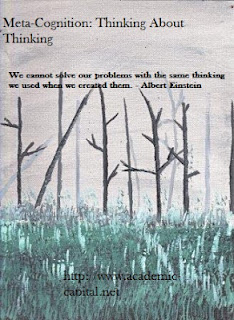Thinking about thinking is an important component of
problem solving in life. The more accurately we can reflect upon our skills the
stronger our strategic approaches and potential successes in life. As we age,
many of us will become more self-reflective and more accurate in understanding
our strengths and weaknesses. Research helps highlight how age brings wisdom in
understanding oneself and our unique approaches to learning about ourselves in
life and society.
Awareness and evaluation of one’s own thinking and
learning process is called metacognition. Meta meaning about self and cognition
meaning thinking. Metacognition is comprised of 1.) knowledge of self, 2.)
knowledge of task, and 3.) knowledge of strategies. It is this understanding of
one’s abilities, the tasks that need to be completed and the strategies of
achieving goals that give such persons an advantage in life.
As people age they become more self-aware and
reflective of their behavior (Vukman, 2005). Through time, this self-awareness
also increases the ability of people to accurately describe and reflect upon
their behavior and mannerisms. This awareness also creates higher levels of
self-development and opportunities for learning
Those students who have higher levels of
metacognition also have greater abilities to adjust their approaches to
problems to find solutions. Through self-reflection, such individuals can
either keep current strategies or adjust future strategies to have optimal
outcomes (Hartman,
2001). It is this superior cognitive monitoring that creates stronger
performance levels, which supersede the ability of many of their peers.
Evaluating
people’s metacognition can contribute to how people develop this sense of self
and how it progresses through life. It also has the potential to tell research
about when a person become reflective of their behavior and when they are more
able to control their actions. People with high levels of metacognition act in
deliberative ways to accomplish their goals.
Research conducted by Vukman (2012) included 282
participants 13-15, 23-25, 33-35, 43-45 years of age. Each group was tested on two constructs that
include reasoning and meta-cognitive self-evaluation of achievement. Reasoning
included spatial, verbal/logical and social reasoning. Meta-cognitive
self-evaluation of achievement included 9 tasks and follow up questions that
associated actual performance with subjective levels of performance.
Results:
-Accuracy of self-evaluation increases with age.
-Men were more accurate than women in
self-evaluations.
-self evaluations were more accurate in spatial,
then verbal and followed by social reasoning.
-Social reasoning was ambiguous and therefore
difficult for people to define.
Analysis:
As people mature, they become more accurate in their
self-evaluations of performance. The research indicates that people learn
skills and are better able to judge their performances based years of gained
experience that comes with age. The most difficult of the three constructs to
self-evaluate are social reasoning due to its complex and ambiguous nature. Yet
the more experience a person gains the more accurate they are in judging social
affairs. To help employees gain a better perspective of themselves and their
abilities it is necessary to provide accurate performance appraisals to help
anchor subjective experience.
Author: Dr. Murad Abel
Hartman, h. J. (2001). Metacognition in learning and instruction:
Theory research and practice. Amsterdam: Kluwer Academic Publishers.
Vukman, K. (2005). Developmental
different in metacognition and their connections with cognitive development in
adulthood. Journal of Adult Development,
12 (4).
Vukman, K. (2012). Metacognition
accuracy and learning to learn: A
developmental perspective. Problems of
Education in the 21st Century, 46 (15).
Understanding the Development of Self-Reflection
